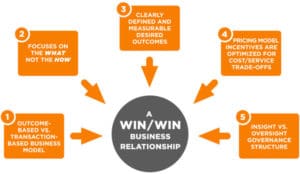Nu Skin Enterprises, a direct seller of nutritional supplements that they develop and distribute, recently signed a Lead Logistics deal with XPO Logistics to manage their global supply chain logistics function. which operate in 54 countries. XPO is one of the largest supply chain solution providers in the world and, while the arrangement has not been in effect long enough for Nu Skin to talk about the benefits they received, what I found interesting was the nature of this agreement. It was based on a vested outsourcing arrangement.
Brad Morris – VP of Global Logistics at Nu Skin, David Pollard – the Executive Director Lead Logistics Solutions at XPO, and Steve Symmes – a Consultant with the Forefront Group, spoke about this at eyefortransport’s 3PL and Supply Chain Summit in Chicago last week. The Forefront Group is a global procurement and strategic supply chain management consulting firm.
ARC has long been a proponent of vested outsourcing. Vested outsourcing can be considered gainsharing on steroids. Although, proponents of vested hate having these agreements compared to gainsharing. A short description of vested principals includes the idea of focusing on outcomes rather than methods, having long-term agreements that reward the service provider for investing talent and capital into achieving quite significant improvements in cost and service, and flexible contracts that can change over time.

From the book “Vested Outsourcing”
Here were a few of the more interesting comments made in the presentation:
- The “RFP” stood for “request for partner” rather than “request for proposal.” It was a short four-page document describing what they were looking for in selecting a supply chain partner rather than focusing on pricing.
- Nu Skin did provide logistics cost data to the 3PL candidates, so that the 3PLs could be comfortable that they could provide value. However, in the final master agreement, XPO has the freedom to increase logistics costs if that will lead to significant enough increases in revenues; The economic model that was developed supports this.
- In the presentations from 3PLs, Nu Skin was looking for IT savvy, innovation, and a cultural fit. Cultural fit was evidenced by a willingness to ask questions of the wide array of Nu Skin stakeholders present and a willingness to listen. Nu Skin was also looking for assurance that the “A team” that was making the presentation would not be swapped out for a “B team” when the deal was executed.
- The initial implementation is being conducted in Southeast Asia. This region was selected because of executive support in that region, and because some of their 3PL days were due to expire shortly.
- There has been a significant emphasis on communication as this is the key to true partnership and collaboration: How often meetings will occur, the cadence of those meetings, and who will be in attendance. Problems will inevitably occur, but there is a clear understanding of how those problems will be escalated and solved.
- As the Lead Logistics Provider, XPO is expected to be “agnostic.” XPO assets for warehousing and transportation may be selected, but XPO must remain agnostic as the LLP and select the best provider for the service and cost requirements.
- Nu Skin has high level executive support that is highly supportive of this deal. Without this support, the supply chain leadership would not have considered this type of arrangement. Despite that, they recognize that there are substantial cultural hurdles that will need to be addressed on an ongoing basis.
In conclusion, a lead logistics relationship is a significant commitment. There deals should always be based on several of the key vested principals, even if the parties to the deal don’t refer to this as a “vested outsourcing” arrangement. Usually, there are not. Finally, kudos to eyefortransport for putting together a terrific show.
















